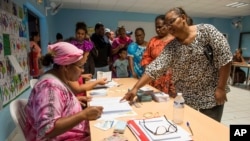The South Pacific archipelago of New Caledonia has voted to remain part of France, election authorities announced.
Officials said 53.26% of more than 180,000 registered voters rejected independence in a referendum Sunday. At least 80% of eligible voters went to the polls.
In a tweet, French President Emmanuel Macron called the vote a “mark of confidence in the Republic.”
“Together we will build the New Caledonia of tomorrow,” he wrote.
New Caledonia's economy is supported by about $1.5 billion in French subsidies each year and many have said they fear the economy will collapse without those payments.
While the territory already enjoys a large degree of autonomy, it does heavily rely on France for some matters, including defense and education.
The referendum is part of a process that started in 1988 to end years of violence between the supporters and opponents of independence from France. A decade later, a deal was reached to have the independence vote in 2018. Although voters said “no” to independence two years ago, the deal allowed for two more referendums to be held by 2022.
Under colonial rule, the territory’s indigenous Kanaks had been confined to reserves and excluded from much of the island's economy.
Political analysts say the Kanaks tend to back independence, while the descendants of European settlers lean toward maintaining the connection to France.





